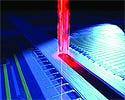Swiss Laser Company Expands U.S. Presence
November 9, 2006
Originally Published MPMN November 2006
INDUSTRY NEWS
Swiss Laser Company Expands U.S. Presence
|
A Swiss supplier offering Laser MicroJet technology will cater to East Coast clients with its new Boston-based micromachining center. |
On the heels of announcing plans for a micromachining center in the Silicon Valley, a Swiss laser supplier has revealed that it will open a second facility in Boston. Set to serve high-tech hubs on both coasts, Synova (Lausanne, Switzerland; www.synova.ch) is working to cultivate interest in its Laser MicroJet technology and expand its presence within the United States.
“Further expansion in the United States reinforces our strategy to better support all of our served markets worldwide,” says Synova chief executive officer Bernold Richerzhagen. “Proximity to our customers is our top priority and, as we continue to promote the adoption of Laser MicroJet in the medical, electronics, and tooling markets, Boston represents an ideal locale to address our U.S. customers’ needs quickly and efficiently.”
Traditionally, U.S. customers have conducted business directly with the company’s Swiss headquarters. Wishing to streamline the process and ensure convenience, Synova determined that bringing the centers to customers’ own neighborhoods would better serve the U.S. market, according to Richerzhagen. By positioning its micromachining centers on each coast, the company anticipates being able to service a significant amount of territory, he added.
“This will be much easier, much faster [for American customers],” Richerzhagen says. “The idea is also to have the full know-how and expertise very close to our customers.”
The multipurpose micromachining centers will serve as competence centers for demonstration, sample testing, and application development. Housed in the facilities will be the company’s LCS 300 unit, which cuts metal stents as well as organic light-emitting diode masks used in flat-panel display manufacturing. Moreover, customers who require cutting services for an application, but are not financially ready to purchase a machine, can reap the benefits of the centers as well: The company plans to have commercial machines available.
Among the main goals of the centers is to generate interest in the company’s Laser MicroJet technology. Suited for such medical applications as cutting stents and surgical blades, the Laser MicroJet equipment uses a water-jet-guided laser. The laser does not produce a heat-affected zone owing to the application of water to the workpiece during the process. The water cools as the laser cuts, thus avoiding damage such as microcracks that are often incurred by heat. Compared with pico- and femtosecond lasers, which also prevent the development of a heat-affected zone, the water-based process boasts a significantly higher ablation rate and depth as well as faster cutting speed, according to Richerzhagen. Employing water in the cutting process also provides an automatic protection layer to the surface of the workpiece by washing away any contaminants.
Based on the success of the first pair of centers, the company will consider expanding its U.S. operations with additional facilities in the future.
Copyright ©2006 Medical Product Manufacturing News
You May Also Like



